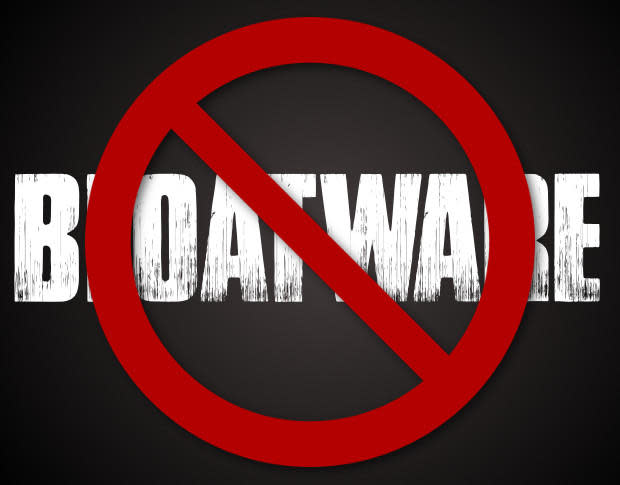End the bloatware now

bloatwarehero.jpg

It was originally reported that the Samsung Galaxy 6 would finally be able to remove the unwanted manufacturer bloatware. The reality of that is not nearly as promising as the rumor. As it turns out, you can only disable said bloatware--leaving it on the device, which still takes up precious space. This was supposed to be a major win, especially considering the Galaxy 6 doesn't have support for an external SD card.
Thanks to an XDA Developers member, it was discovered that the rumors were quite false. With that said, I have something to say to every manufacturer of every Android device on the market:
Enough with the bloatware!
Of the collection of Android devices I've used over the years, I have never--not once, ever--used a piece of bloatware. It just sits there, unused and taking up space. Why have I never used a single piece of manufacturer-added software? Because every piece of it pales in comparison to either its Google or third-party alternative.
In fact, one of the first things I always do with a new device is install Nova Launcher Prime and hide the bloatware from the app drawer. Why? Because it's all useless.
Motorola Assist? No thank you, I have Google
Droid Catalogue? Nope, I have Google Play Store
Verizon Messages+? Have you met Google Hangouts?
VZ Navigator? Can you lead me to Google Maps?
You get the idea. The problem is, device manufacturers do not. For some odd reason, they have yet to figure out that their bloatware rarely gets used and does nothing but take up precious space and frustrate users. There is only one company that can pull off the addition of bloatware on a device--Google. Why? Because their bloatware actually works and works well. Even if you don't make use of every Google app on your device, you may some day (and when you do, you can be assured it will serve its purpose well).
The main difference between Google and the other companies adding bloatware is that the Google bloatware can, on certain levels, be considered part of the platform. You cannot remove Gmail because it's an inherent piece of Android (even if you use Inbox as your default Google Email client). There isn't a single piece of bloatware on the market that is intrinsic to the Android ecosystem. In fact, much of it is counter to the very heart of Android and actually has a negative impact on the device.
To that end, I must repeat to every manufacturer on the market:
Enough with the bloatware!
I, and probably every user on the planet, have had enough. We need our internal storage space and do not want to mess with the clutter you are adding to the Android app drawer. What you offer adds nothing to the experience. Nothing.
Verizon, AT&T, Sprint, HTC, Samsung, Motorola--and nearly every other company invested in releasing Android devices--needs to understand that bloatware is one of the reasons some people root their devices. You should take a moment to consider that. People actually take the time to root their devices to rid them of your bloatware.
One of the big questions that always pops into my mind when I see bloatware on a phone or tablet is "Do manufacturers think users need a reminder of what device or carrier they are using?" First and foremost, I'm fairly certain that every time a wireless bill comes in the mail, users knows who their carrier is (or the day before their bill is due, they receive an email from said carrier proclaiming said bill to be overdue). I'm also fairly confident the second users pick up their devices, they know who made it. All they have to do is flip it over and see the company logo. In fact, if I flip over any of the seven Android devices I have, each of them both clearly state the device manufacturer and the carrier.
So, carriers and manufacturers, answer the one question that is on everyone's mind at the moment: "Why do you insist on included substandard, redundant, bloatware on the devices you sell?"
The only answer (I'm confident) the masses will accept is: "We don't know, so we're going to remove it ASAP."
It never ceases to amaze me that bloatware is still a thing, especially considering how limited storage space is on mobile devices. Recovering that space could mean the difference in a user running out of internal storage or not.
Have you ever come across a piece of carrier or manufacturer software that you've used? If so, which app was it, and how was it superior to the Google or third-party offering? Let us know in the discussion thread below.

